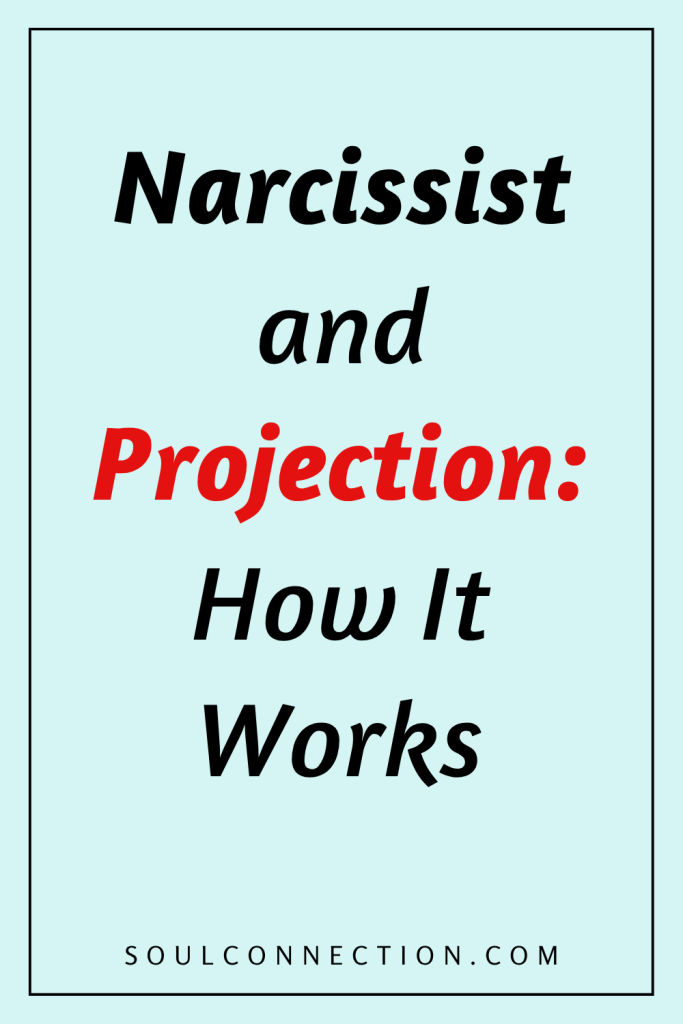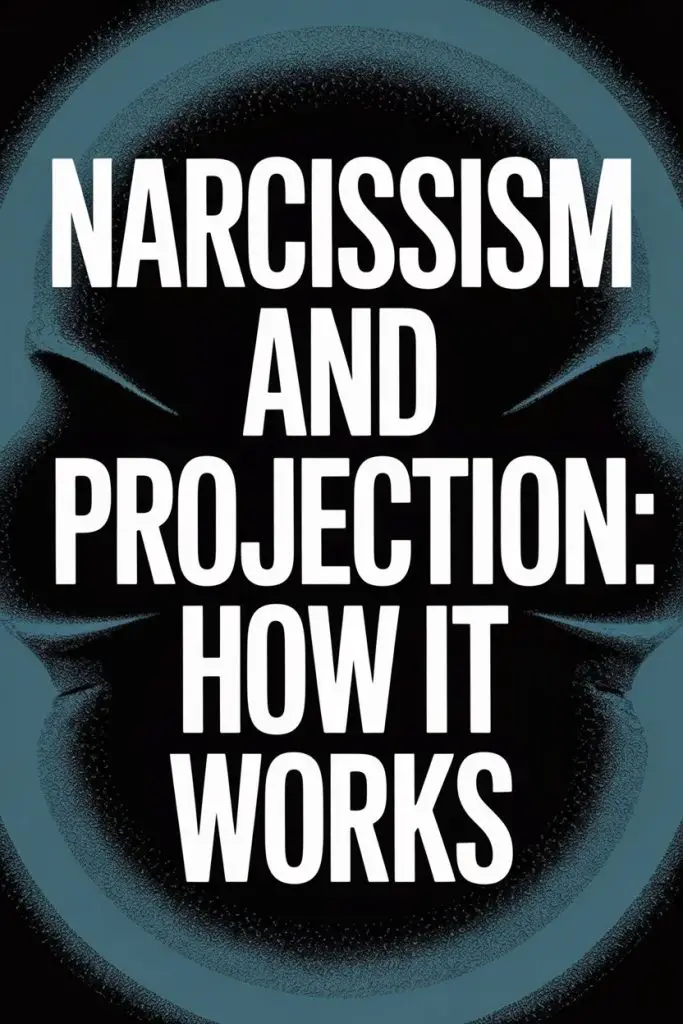Ever had a conversation that left you wondering if you accidentally walked into The Twilight Zone? You know, those moments where someone insists you have the very traits they’re famous for displaying?
Welcome to the wacky, mind-melting circus of narcissistic projection.
What Is Projection, Anyway?
Psychologists might put it in fancier terms, but at its core, projection is the psychological equivalent of the old “I’m rubber, you’re glue” schoolyard chant.
Except, when narcissists do it, it’s less playful and more like being hit with a bag of emotional bricks.
Projection happens when someone attributes their own thoughts, feelings, or behaviors to another person. For narcissists, this isn’t just an occasional slip—it’s their go-to move.
They’ll accuse you of being selfish while polishing their own “World’s Biggest Selfie Taker” trophy. They’ll call you manipulative while orchestrating emotional puppet shows that would make Shakespeare proud.
Why Narcissists Project
Picture an overstuffed closet jammed with things no one wants to see. For narcissists, their closet is packed with insecurities, shame, and all those not-so-adorable traits they refuse to own.
Actually admitting to these flaws? Absolutely not—it would shatter the fragile image they have of themselves as flawless beings. Enter projection.
By slapping their unwanted feelings onto someone else, they get to avoid self-reflection. It’s emotional hot potato: “Not mine! Yours!” Toss, deflect, repeat.
Classic Signs of Narcissistic Projection
Ever noticed how arguments with a narcissist feel like being spun around in a tilt-a-whirl? That’s projection at work. Here are a few favorite moves from their playbook:
1. The Blame Boomerang
Accuse them of lying, and suddenly you’re the dishonest one. Confront them about cheating, and—like magic—you become the untrustworthy party.
Narcissists are unmatched at turning the tables, leaving you second-guessing your own reality.
2. Emotional Gaslighting
Projection pairs beautifully with gaslighting (a phrase you probably wish you’d never had to learn). The narcissist points fingers and insists, “You’re too sensitive,” right after they just stomped on your feelings with hobnail boots.
“You’re so controlling!” they’ll say, moments after delivering a list of rules only a prison warden could love.
3. The Victim Switcheroo
Suddenly, the person who just raged at you is desperately sobbing about how they never get heard. Their pain is always bigger, their wounds always deeper.
Your legitimate concerns? Dismissed as selfish or dramatic.
Why It Feels So Confusing
Most people like to think relationships operate on at least a basic level of reality.
Arguing with a narcissist, though, can feel like speaking two different languages—yours based in honesty, theirs in projection. The mental whiplash is real.
What makes it so disorienting? Narcissists are masterful at sounding convincing. They’ll spin stories, cite imaginary “proof,” and deliver Oscar-worthy performances.
If you’re empathetic (read: not a robot), you probably stop to consider whether they’re right. This is where the self-doubt creeps in and you start to wonder if maybe—just maybe—you are the problem.
Spoiler: You’re not.
Impact on Relationships
Living with projection isn’t just annoying—it’s downright damaging. Over time, constant accusations and reversals chip away at your self-esteem.
You might start apologizing for things you never did, or walking on eggshells just to avoid triggering the next round of blame.
Worse, it can erode trust. If every conversation is a game of emotional dodgeball, intimacy goes out the window. Instead of feeling connected, you may find yourself isolated and anxious, always bracing for the next twist in logic.
How to Spot Projection in Real Time
Wish you had a magic decoder ring for narcissistic antics? While the decoder ring might be lost in the mail, some signs can help you spot projection as it’s happening:
- Sudden role reversals: You bring up a concern, and suddenly you’re on trial for the very same thing.
- Intense defensiveness: The more you try to calmly discuss an issue, the more wild the accusations get.
- Patterns, not flukes: Everybody slips up sometimes, but narcissists project like it’s their part-time job.
If these scenes sound familiar, congratulations—you’ve identified projection in the wild.
Practical Strategies for Dealing With Projection
Wishing for a magic wand is understandable, but reality calls for practical moves. Here’s what can actually help when dealing with projection:
Stay Grounded in Facts
Journaling might sound eye-roll-worthy, but tracking what was said and done keeps your reality intact. When the next accusation comes flying, you’ll have a written record to remind yourself you’re not losing your marbles.
Limit Emotional Engagement
Arguing with a narcissist about whether you’re really the liar or manipulator? That’s like challenging a chess grandmaster to a game where they invent new rules mid-match.
Sometimes, the best move is to step back and refuse to play.
Set Boundaries Like a Pro
Clear, consistent boundaries protect your sanity. If the conversation veers into projection territory, it’s okay to say, “I’m not going to discuss this if you keep accusing me of things I haven’t done.”
Then, actually step away. Boundary enforcement, not just boundary setting, is key.
Seek Outside Support
Even the strongest humans need backup. Trusted friends, a therapist, or a support group can help you keep your head on straight when you feel gaslit into oblivion.
What Not To Do When Facing Projection
Tempting as it is, don’t get sucked into the narcissist’s drama vortex. Here’s what won’t help:
Don’t Try To “Prove” Yourself
Narcissists aren’t interested in objective truth. Waving evidence or screenshots usually just escalates the mind games.
Don’t Mirror Their Behaviors
Resist the urge to play “tit for tat.” Meeting projection with projection will only add fuel to the fire.
Don’t Take It Personally
Easy to say, hard to live. But try to remember: their need to project is about their own inability to cope with themselves. It’s not an accurate reflection of you.
How Projection Fuels the Narcissist’s Ego
For narcissists, projection isn’t just defense—it’s offense. Disowning flaws and pinning them on others lets them keep feeling superior and blameless.
If they admitted fault, their carefully constructed self-image would start to wobble. Projecting lets them keep dancing around that unpleasant truth.
It’s a bit like a magician’s sleight of hand. While everyone’s busy staring at the thing they’re pointing out (“Look at your terrible attitude!”), nobody’s focusing on the narcissist’s own behavior.
What Healthy Responses Look Like
Handling a narcissist’s projection doesn’t require superpowers—just some skills that, let’s be honest, should come with a free spa day.
- Validate your own feelings. If something feels off, trust that inner siren.
- Communicate your boundaries clearly, and back them up with action.
- Detach with kindness when possible. Responding with calm, non-judgmental statements (“That’s not my experience of the situation”) can shut down escalation.
- Prioritize your well-being. Protect your energy. Sometimes, that means limiting contact—yes, even with family.
When to Seek Professional Help
Facing projection day in and day out can leave even the most resilient folks feeling like a shadow of themselves.
If you’re stuck in repeated cycles, or if the self-doubt becomes overwhelming, reaching out to a mental health professional can make a world of difference.
You deserve support that helps you untangle what’s yours and what never belonged to you in the first place.
Living Beyond the Blame Game
Surviving narcissistic projection can feel like running a marathon with someone constantly tossing banana peels in your path. But—good news—recognizing the game is half the battle.
With a few practical tools, solid boundaries, and a dash of self-compassion, you can sidestep the worst of it.
The narcissist may keep tossing accusations your way, but you get to decide what sticks. And nothing says “I win” quite like refusing to play their game.


